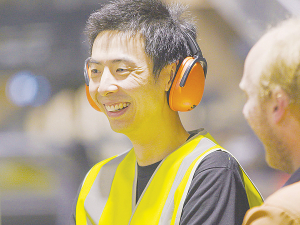Crafting the best hops
Mac Hops director, Brent McGlashen, is a fifth-generation farmer on his family farm in Nelson.
 Nelson Lakes Hops director Richard Wong says the new hop farm is the result of careful consideration and extensive planning.
Nelson Lakes Hops director Richard Wong says the new hop farm is the result of careful consideration and extensive planning.
A former dairy farm in a secluded valley on the fringe of Nelson Lakes National Park is set to become New Zealand's biggest hop garden.
Mount Ella Station, near Murchison, previously ran more than 3,000 milking cows - but now they're all gone, replaced by rows of tall trellises on which the aromatic beer-flavouring vines grow.
Nelson Lakes Hops, the new sister farm of industry leader Freestyle Hops, took over part of the 1,000ha farm between Nelson and Westport in 2021, after doing extensive soil, water and climate analysis on the property.
The venture defies conventional wisdom - a previously-held view that hops could only be grown commercially further north in the Tasman District.
"There hadn't been much effort to expand hops farming at scale to elsewhere in the country - but the data we collected convinced us this was an ideal location," Nelson Hops director Richard Wong explains.
The farm is the result of careful consideration and extensive planning with the support of hop grower and processor, Freestyle Hops, and leading brewery, Garage Project.
The farm is large enough to allow the company to think big, and it has developed plans for growing and processing hops on a scale never seen before in New Zealand. The final product will become a new addition to Freestyle Hops' core offering.
Once complete, the farm will have over 370 hectares planted in hops, with two high-tech multi-million-dollar processing plants on site. Further expansion opportunities could take the farm beyond 550ha of hops.
"New Zealand hops varieties are highly sought-after internationally," Wong says. "Their unique aromas and flavours make them popular with craft beer makers around the world, and we've already had extremely encouraging feedback from our first harvest."
The emergence of Hāpi, a joint venture between Garage Project and Freestyle Hops, to promote the New Zealand hop industry attracted Wong to the project and the value hops can bring to the New Zealand economy.
"This is a high-value horticultural product, and it has significant export potential," Wong adds.
"The demand is there for high-quality hops. We just need to grow more and make sure we get the very best prices for it - the opportunity is huge."
After years of intensive agriculture in the valley, Wong is equally passionate about making the company's operations as environmentally sustainable as possible.
Most of the power needed for the hops processing plant can be taken from a neighbour's hydro-electric scheme.
Combined with the short growing season, from October until March, and the use of drip irrigation, he says the farm will have a significantly reduce carbon footprint and impact on the environment, from the previous dairy operation.
"We're looking at planting more trees around the garden, especially in the unproductive areas, as that will further enhance the environment and can help us offset any carbon we use - it's certainly something we want to explore more," Wong says.
While teams have been working to plant the farm in hops and install the extensive trellies needed to support the vines, Nelson Lakes Hops' largest capital investment has been importing and installing the processing plant.
"It's been a pretty challenging time, given the inflationary period that we've had, rising construction costs and supply chain issues," Wong concedes.
"Thankfully we've been able to manage the budget very successfully with the help of our shareholders and ANZ, who have been really supportive throughout."
ANZ Business general manager John Bennett says the venture is a great example of what is possible when industry leaders come together and combine their strengths.
"Changing Mount Ella Station from dairy to horticulture, Nelson Lakes Hops and its partners have discovered an opportunity, adding value at every step," Bennett explains.
"They've attracted capital to the industry and are now well on their way to proving that a scalable, high-value crop like hops is a great option for all involved."
Wong is keen for the garden to become a strong contributor to the local economy, offering jobs and training to those interested in working in the industry.
"We aim to be the largest contiguous hop farm in New Zealand," he says. "We want to help push the New Zealand hop industry to a new phase of growth and for it to become a leader in quality.
"If we can do that, I think that will result in long term value for our shareholders, the local community, and the country."
Two kiwifruit orchards in the Bay of Plenty and one in Northland are this year's finalists for the Ahuwhenua Trophy competition.
The Government's chief science advisor, Dr John Roche says the key objective for the science sector in the coming year is bedding down the reforms which sees the merger of the previous entities.
Hawke's Bay apple grower Taylor Corporation says a standout 2026 season, coming after a few difficult years, is boosting optimism among growers.
Horticulture New Zealand (HortNZ) has added its perspective to numerous primary sector voices urging the Government to strengthen its draft legislation to replace the Resource Management Act (RMA).
The Commerce Commission has finalised new information disclosure requirements for local councils and water organisations that deliver water supply and wastewater services.
Beef + Lamb NZ (B+LNZ) is calling for significant changes to the Government’s reforms to the Resource Management Act (RMA).

OPINION: The proverbial has really hit the fan in Wellington and exposed a glaring example of a double standard in…
OPINION: Dark suited spin doctors exist to, well, spin, and the nice cuddly progressive types at Greenpeace Aotearoa practice this…